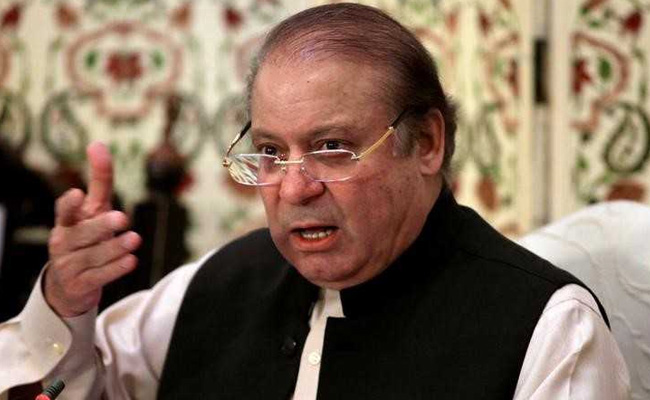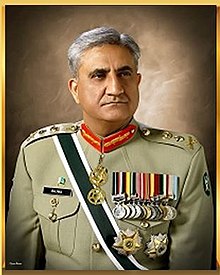
For the apologists of the Pakistan army’s meddling in politics, who also worry about Pakistan’s image, the latest issue of The Economist poses a problem.
Apologists for the Pakistan army’s interference in politics have always sought to blame the civilians and argued that the Pakistani military helps bolster Pakistan’s image abroad. It is also claimed that the military’s views have the overwhelming support of the people of Pakistan. In recent years, some apologists for the military have even argued that a Western audience does not understand Asia or South Asia “At the core of this Eurocentrism is a tendency to view Pakistan’s civil–military relations through a foreign policy lens, while almost entirely neglecting the domestic political and structural issues at play.”

This kind of an apologetic view comes in for strong critique in the latest issue of The Economist. The influential weekly journal states that the Pakistan army has always interfered in politics, that the army is using every trick in its handbook to sideline former PM Nawaz Sharif, that the army has targeted the media, and that this time around the Pakistani people do not want the army to interfere and are pushing back through groups like Pashtun Tahaffuz Movement (PTM). The article’s tone also makes it clear that far from improving Pakistan’s image, the political shenanigans of the military and its apologists actually distorts how the world views Pakistan.
In an article titled “General dysfunction: Pakistan’s army is using every trick to sideline Nawaz Sharif, Ordinary Pakistanis are resentful of its unchecked power” The Economist notes this is not the first time that “Pakistan’s army decided to respond to claims that it was attempting to fix next month’s general election … In 1990, for instance, the army-dominated spy agency, Inter-Services Intelligence, funnelled cash to opponents of the left-wing Pakistan People’s Party (PPP), helping to secure its defeat. The military spokesman, General Asif Ghafoor, sternly denied that any such “engineering” was going on this time around. But a pile of evidence to the contrary is poking through the camouflage.”
The Economist noted: “The object of the army’s meddling is Nawaz Sharif, who was ousted as prime minister by the courts last year. Mr Sharif had been the beneficiary of the army’s largesse in 1990, when he began his first stint as prime minister. But they soon fell out. He resigned under pressure from the army in 1993 and was toppled again by it in a coup in 1999. Mr Sharif returned to power in 2013 eager to assert civilian control of foreign and security policy, which the army regards as its exclusive domain. In reply, the army undermined Mr Sharif, backing a months-long street protest by a big opposition party, the Pakistan Movement for Justice (PTI), aimed at overthrowing his government. It also refused the government’s request for help in dispersing another group of protesters that had blocked a busy intersection last year. A general was photographed at the scene handing money to the protesters. The army bristles at claims that it steered the Supreme Court to remove Mr Sharif last year on flimsy charges of “dishonesty”. But Mr Sharif (pictured, with gun) blames its unseen hand. Indeed, Mr Sharif is trying to turn the impending election into a referendum on his treatment by the generals, although he coyly refers to them using such codewords as “the establishment” and “aliens”. Last month he accused the army of facilitating a terrorist attack in India in 2008, in which 166 people were killed. Never has the army felt its privileged position so threatened, says Talat Masood, a former general.”
The Economist scathingly wrote: “Indirect elections to the upper house of parliament earlier this year give a sense of how the army operates. Weeks before the country’s four provincial assemblies were due to select the new senators, the government of the sparsely populated province of Balochistan, which was led by Mr Sharif’s party, the PML-N, collapsed owing to the abrupt defection of several lawmakers. One of Mr Sharif’s allies accused the ISI of orchestrating the insurrection. At any rate, independents and the former PML-N members went on to form the pro-military Balochistan Awami Party (BAP), which then secured several of Balochistan’s seats in the senate. The new senators, in conjunction with an improbable alliance of otherwise feuding opposition parties, together mustered enough votes to defeat the PML-N’s candidate for chairman of the senate. (An Urdu-language newspaper carried details of how the army allegedly helped senators to remember how to vote, by marking the corners of their ballot papers.) That, in turn, put paid to the PML-N’s hopes of passing legislation to scrap the woolly articles of the constitution that the courts had used to justify Mr Sharif’s dismissal. Imran Khan, the leader of PTI, does not deny that the army interferes in politics. He says a stronger civilian government (meaning one led by him) is the answer. He may have his way. PTI has benefited from a wave of defections from the PML-N in the most populous province, Punjab. In private, many politicians admit to being pressed, in some cases with the threat of corruption charges, to leave the PML-N. If the PTI can make headway in Punjab, where the PML-N won 116 of 148 seats at the last election, in 2013, Mr Khan stands a good chance of becoming the leader of a coalition government. Such a government would be “preferable” to the army, adds Hussain Haqqani, a former diplomat.”
The Economist pointed towards the censorship and attacks on the media: “Media outlets that caterwaul about all this become the victims of commercial crises. Geo, the most popular television station in the country, was mysteriously dropped by cable companies. They relented when it toned down its criticism of the judiciary and its support for Mr Sharif. Gul Bukhari, a journalist who supports the PML-N, was recently abducted for several hours. This week Dawn, a liberal newspaper, announced that it is being barred from distributing in much of the country. We are “110% muzzled”, sighs one journalist.”
The Economist article also notes popular sympathy towards Mr Sharif and PTM: “The only thing standing in the way of the army’s plan is voters’ apparent sympathy for Mr Sharif. His rallies draw large crowds. Polling by Gallup puts the PML-N 13 points ahead of the PTI nationally, and 20 points up in Punjab. “We know the establishment might attempt to manipulate the elections,” says Muzzafar Mughal, a resident of a swing district in the city of Rawalpindi, “but we will vote for him again.” Indeed, many Pakistanis have recently begun expressing unheard-of criticism of the army. A burgeoning civil-rights organisation, the Pushtun Protection Movement (PTM), was formed last year to protest against the army’s tactics in its campaign against Islamist insurgents. The PTM accuses the army of indiscriminately flattening villages. It wants the UN to investigate the fate of 20,000 missing people, and calls for the removal of military checkpoints and curfews in the tribal regions where most of Pakistan’s 30m Pushtuns live. The army’s response has been fierce: 37 PTM activists have been arrested for “sedition”. Manzoor Pashteen, the movement’s charismatic 24-year-old leader, was last month prevented from boarding a flight to a rally in the southern city of Karachi. He drove for two days to get there instead. When he arrived, he found 10,000 supporters sitting on the ground in the dark. The firms contracted to provide chairs and lights for the event had suddenly pulled out—yet another of the unexplained reversals that are so common when criticism of the army is involved. Non-Pushtuns are starting to support the PTM, a source of particular concern for the army. At the rally in Karachi, a 66-year-old woman from Balochistan, where locals have also long complained of military abuses, held up a picture of her son, missing for a year, for the cameras. Some generals counsel a softer response. The PTM activists awaiting trial have belatedly been granted bail, possibly a sign that the army is relenting slightly. But it does not seem to have the courage needed to make a broader retreat from politics.”
![]()





